Sly Dog Rum: revolutions need revolutionaries
By Georgie CollinsBritish rum brand Sly Dog has landed a ‘significant’ investment that will allow it to ‘turn up the volume’ on its mission to modernise the spiced rum category.
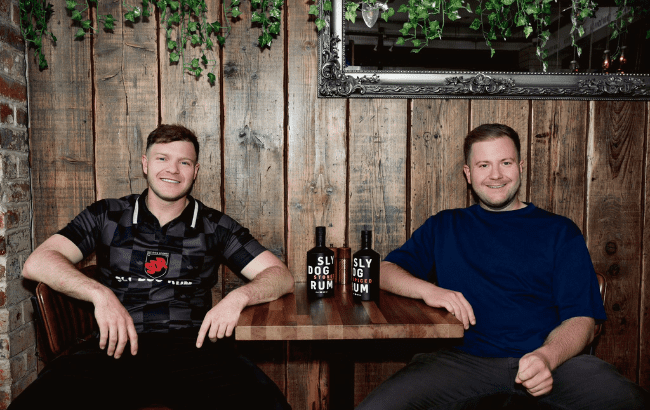
Brothers Louis and Bruce Goddard-Watts founded Sly Dog Rum in 2020 with the primary motivation of modernising the spiced rum category, which the pair felt was stuck with a cheap, low-quality image.
Together, the siblings sought to create a premium spiced rum that broke free of the stereotypical pirate imagery associated with the category. They aimed to develop a spirit that was both relatable and appealing to younger consumers while also bridging the gap between cheap and premium spiced rums.
To achieve this, the pair focused on creating a high-quality rum with natural ingredients, unique flavour profiles, and a modern brand approach. The brand’s core philosophy was to challenge the existing rum market by offering something different – a spiced rum that was premium, accessible, and didn’t take itself too seriously.
Speaking to The Spirits Business, the duo shares that since launch, they have faced numerous challenges. Louis explains: “We’re trying to modernise the way people view [spiced rum] so it’s not looked at as the cheap, bastardised version of rum.”
He notes that neither he nor his brother has a background in the spirits industry. While this has been a challenge in some respects, ultimately it has allowed them to create a brand from the perspective of a ‘normal’ consumer. Bruce adds: “The flavours we chose are not flavours that have been foraged from somewhere, and you’re only going to know about if you work in the top bars. We’re trying to make it relatable – premium, but relatable – in terms of the flavours. We’re just basically trying to get more people drinking rum.”
The brand currently boasts two expressions: Spiced Rum, which combines a medley of ‘secret’ tropical spices to deliver a warming, Caribbean rum; and Stoned Fruit, the UK’s first rum infused with papaya, peach and apricot. Both are presented at 40% ABV and retail on the brand’s website for £35 (US$47) per 700ml bottle.
The pair explain that their aim has also been to create a brand and a product that makes people feel good.
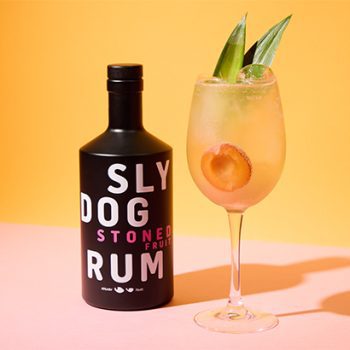
“The initial idea was to be very brand-led. These days, if you look outside of drinks, there are lots of brands that have popped up in the past 10 years that people feel really close to,” Bruce says, using sportswear brand Gymshark as an example. “It’s a brand where you feel good by buying it. Essentially, it’s bringing something to the table – you feel better for buying this one. You feel better being seen wearing Gymshark. We definitely felt like – specifically in spiced rum, but also spirits as a whole – there was a lack of this ‘feel-good factor’ of aligning yourself with a brand.”
The pair note that one drinks brand that has achieved the ‘feel-good factor’ is fruit-based beer producer Jubel. Bruce says: “It has a community culture thing going on.” Despite having a strong fanbase, no one considers minor details such as where it’s brewed, he claims. “No one cares when you’re drinking it. You just feel good because you’re drinking Jubel. We definitely felt like spirits had a real lack of that.”
He believes this is down to the prevalence of “monolithic spirit owners that have done things a similar way for a very long time.” “They have grounded themselves in traditionalism, and they’ve struggled to innovate. Especially within rum, it’s quite hard to get to something that’s considered new when your entire brand is based on traditional stories. It’s quite hard to suddenly release a relatable, bold brand with spiced [rum] as its main thing, without going back on what you’ve already been doing.”
“The next big thing”
The biggest issue the brothers have with the rum category, and specifically within the spiced rum sub-category, is its lack of innovation.
Bruce says: “Much of [the spiced category] is leaning towards that one specific idea – the whole pirate vibe. But it’s hard to expand that to a big group of people. It’s not relatable, it’s not cool. I think it’s all had its day.
“In the four years I’ve been doing this, everyone’s always been saying rum is going to be the next big thing. But they’re expecting it to become the next big thing just by people buying more of the same thing with no innovation and no new ideas.
“The phrase that gets banded around is ‘rum revolution’. But no one’s really doing anything revolutionary. The people who keep calling for a rum revolution are just hoping that means more people are suddenly going to drink rum. Why would that ever happen? You need something that people can feel something about.”
He adds: “I think a lot of premium brands try to work out what they’re bringing to the table to justify their process. A lot of them end up talking significantly about provenance and geographical status, but if you’re trying to skew towards younger people, they care more about what that brand is making them feel.”
The duo notes that their rum, sourced from the Dominican Republic and Jamaica, has all credentials they could need to spin that provenance story. However, Bruce says: “When two people are sharing a glass of this, having a good time, they’re not worried about that. They’re worried about the bottle sat in front of them and having a good time while they drink it. We thought that it was the right time to try and create something that could fill that gap.”
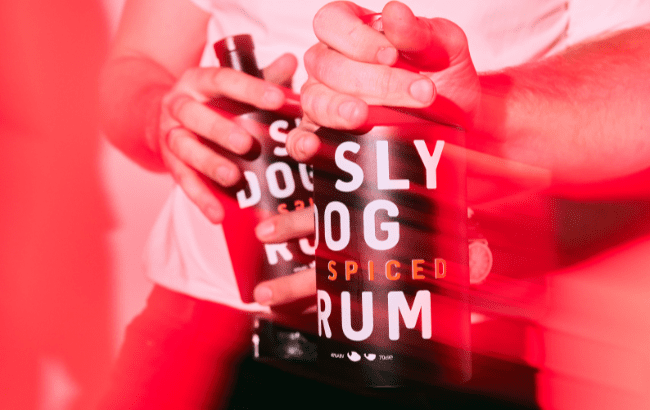
Lacking middle ground
The issue, they say, is that the leap between cheap entry-level offerings and premium and super-premium rums is too large. By failing to cater to those trading up from the likes of entry-level spiced rums such as Kraken or Dead Man’s Fingers, for example, those drinkers are being driven to other categories.
Louis explains that when looking at spirits menus in the on-trade, the typical selection is “five cheap spiced rums, and then you’ve got to move into the serious rums. There’s no real middle ground. That’s why people end up thinking: ‘Oh, I’ll drink whisky instead, or I’ll start drinking Tequila or gin.’”
While Louis was at university, his spirit of choice was Captain Morgan. By the time he left higher education, he was ready to elevate his drinking experience with a spiced rum in the next tier up. “I needed that middle ground. I was earning a bit of money, and I wanted to spend more on something that I like to drink. But, in the end, there was nothing really there. I didn’t like the flavour of a Diplomático, for example. So I was still drinking my uni drink and thinking: this isn’t it. All of my friends who drink vodka had a step up, but spiced rum, specifically, was expecting me to suddenly like something that tastes completely different. To bridge that gap, be that middle ground, that is our goal.”
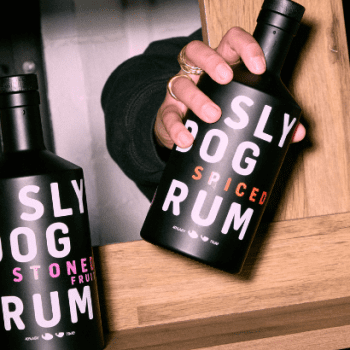 ‘Significant’ investment
‘Significant’ investment
To launch Sly Dog, the brothers invested their own money. “There was a lot of trying not to spend very much money, then thinking: Oh, but it’s not going to work unless we spend lots of money, and then having to invest more and more and more,” says Louis.
This led the brothers to seek out strategic investment that would allow them to grow the brand. “Distribution-wise, we’re really well-positioned. What we didn’t have was the money to afford full-time salespeople and stuff like that. So the proposition we were able to take to a potential investor was pretty clear.”
The pair have now received backing from the founder of mixer brand Clearer Twist, Ross Lazaroo-Hood. While the value of the investment remains undisclosed, the two founders confirm that the amount is enough to provide the brand with approximately “18 months of significant spending capacity” to execute its growth strategies, which include bolstering its sales team with full-time sales professionals who can communicate the brand’s culture and community-focused approach.
“There are lots of things we had ready to go that we can do now,” says Louis. “It’s happening at just the right time, with all these wholesalers now listing us based on our own work, on limited budgets. We can now take things to the next level.”
Furthermore, the brothers confirm the cash injection will allow Sly Dog to become more price competitive by taking advantage of larger production runs and built-in efficiencies, without compromising product quality. “In terms of production capability, we can ramp that up significantly if we need to,” Louis confirms, adding that they’re also trying to do less frequent and larger runs to help with the company’s eco credentials.
In addition, the investment will allow the company to increase its brand awareness via marketing activations and partnerships.
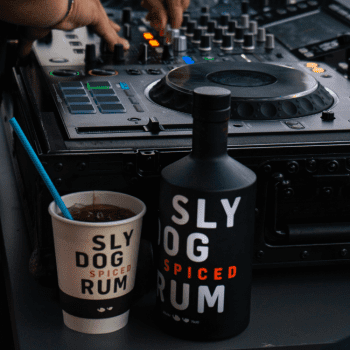
Bruce explains: “I think partnership is the way forward. We want to try to take inspiration from brands that are not in alcohol or not in spirits, and try to do that to a spirit brand. These are the brands that everyone’s getting a big community for. They’re all about collaboration. They’re always doing crossovers and all this kind of thing. It’s like the whole life has been sucked out of spirits a little bit. It’s all so stale and serious, and there’s not really much fun going on anymore.”
Louis adds: “I think people forget that the main reason you’re drinking it is to have fun.”
One partnership the brand has already embarked upon is with the ‘king of the chicken wing’ Jack Blumenthal – son of acclaimed chef Heston Blumenthal and owner of Ed Sheeran-backed fried chicken restaurant, Ginger Wings. The two brands joined forces at Pub in the Park in Marlow in May, and will reunite again at Wing Fest in July to shine a light on their complementary offerings, serving Sly Dog cocktails made with Ginger Wings’ hot honey. In addition, they are working together to bring out a ready-to-drink canned ‘Nduja Hot Honey Rum Picante.
“I think why our brands align is that [Ginger Wings] doesn’t take itself too seriously,” Bruce shares. “I want Sly Dog to align itself with less serious faces. It wouldn’t suit us to do a takeover of the fanciest cocktail bar in a hotel in London. We’re trying to be relatable to people, you know? Wings are pretty relatable to people. They’re accessible. And it’s flavour-led, and it’s energy-led as well.”
He adds: “At Pub in the Park, we had the wings on one side, we had the DJ booth in the middle, and we had the bar – it was the perfect fuel, fire and frequency, just hitting everything that you need for a fucking good day out.”
Related news
Black Tears spiced rum returns to UAE
